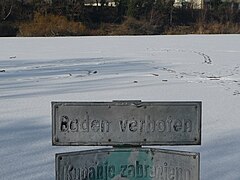Ice pond

Eisweiher stands generically for smaller, usually relatively shallow still waters , which freeze over quickly in a favorable location (sheltered from the wind) and appropriate weather conditions ( frost lasting a few days ). They are of natural origin or have been specially created for use. Before the invention and distribution of the refrigeration machine based on the Joule-Thomson effect, the purpose and motive for naming it was the removal of ice blocks in winter, with which one can remove perishable goods in summer, e.g. B. could cool beer in cellars; others served and still serve with their ice rinks for leisure activities such as winter sports with z. B. ice skating , ice hockey game or the like. Some are only referred to as "ice ponds" in the cold season.
The name Eisweiher has often stuck to such waters even if they are also or exclusively used for other purposes today, such as mill ponds , as extinguishing water reservoirs , fish farming or recreational purposes such as bathing or driving in rowing and pedal boats .
Examples
Eisweiher is a proper name or part of proper names, among others, of the following still waters:
- Dürrener Eisweiher , pond near the Lower Argen near Weingarten, municipality of Kißlegg , district of Ravensburg, Baden-Württemberg
- Eisweiher (Altneuwirtshaus) , lake in the lower reaches of a left tributary of the Truppach near Altneuwirtshaus, municipality of Plankenfels , district of Bayreuth, Bavaria
- Eisweiher or Ickinger Weiher or Ickinger Stausee , lake between the Isar and its right tributary Mühltalkanal in front of the Aumühle , Egling municipality, Bad Tölz-Wolfratshausen district, Bavaria
- Eisweiher (Espasingen) , pond next to the Stockacher Aach opposite Espasingen , town of Stockach, district of Konstanz, Baden-Wuerttemberg
- Eisweiher (Fischbach) , lake in the course of the Fischbach to Fischbach , independent city of Nuremberg, Bavaria
- Eisweiher or Taxetweiher , quarry pond on the edge of Ismaning , Munich district, Bavaria
- Eisweiher (Moosrain) , lake on the left at Festenbach in the settlement zone of Moosrain, municipality of Gmund am Tegernsee , district of Miesbach, Bavaria
- Eisweiher (Sindelfingen) , one of the Hinterlinger lakes in the course of the Diebskarrenbach (in the creek system of the Schwippe ) in the urban area of Sindelfingen , Boeblingen district, Baden-Württemberg
- Eisweiher (Titisee) , pond in the course of a tributary of the Titisee near Titisee, town of Titisee-Neustadt , district of Breisgau-Hochschwarzwald, Baden-Wuerttemberg
- Eisweiher (Uttwil) , two ponds in the course of the Uttwiler Weiers (to Lake Constance ) in front of the Hägnenhof, municipality of Uttwil , district of Arbon, canton of Thurgau
- Eisweiher (Wunsiedel) , lake between the Röslau and its left tributary Mühlgraben in Wunsiedel , district of Wunsiedel in the Fichtelgebirge, Bavaria
- Markdorfer Eisweiher , group of silting ponds at Espengraben in a low moor near Markdorf , Bodenseekreis, Baden-Württemberg; Nature and landscape protection area
Ice pond Große Blies near Ludwigshafen am Rhein - Mundenheim (February 2012)
Damming Eisweiher Fischbach (October 2010)
Ice pond " Taxetweiher " near Ismaning (February 2015)
Ice pond near Neuhofen (February 2012)
Verlande Santander Markdorfer Eisweiher (May 2011)
Ice pond near Titisee
(June 2014)
See also
swell
- Water search on: udo.lubw.baden-wuerttemberg.de (here with relevant layers already activated , State Institute for the Environment Baden-Württemberg (LUBW) ( information ))
- Search for waters at: geoportal.bayern.de/bayernatlas-klassik (under the binoculars in the menu above; old version of the BayernAtlass )
- Search for waters on: Geoserver of the Swiss Federal Administration ( information )






